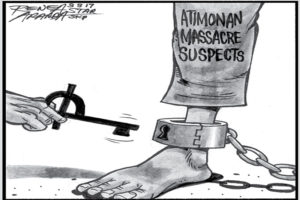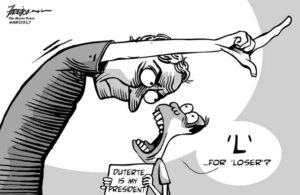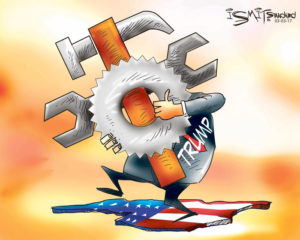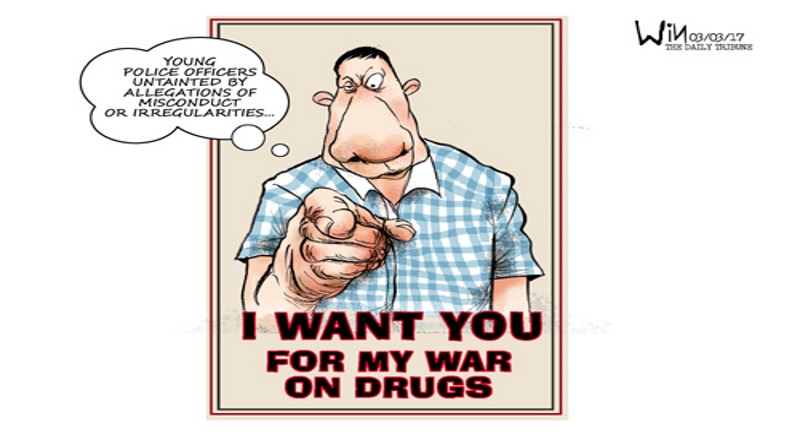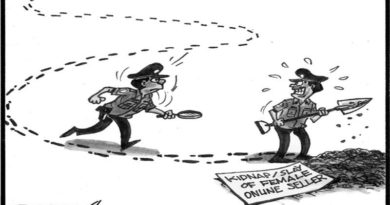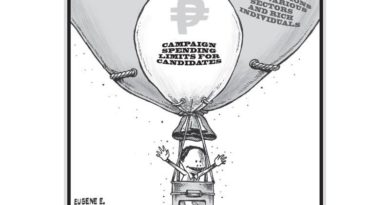Mr. Duterte’s war, Part 2
The Philippine National Police is set to resume the Duterte administration’s war on drugs. This is a course of action that is both unsurprising and deeply unsettling—because the factors that forced the administration to announce a ceasefire have not yet been fully addressed, and because the killings, which did not in fact stop, will inevitably spike again.
The administration was compelled to stop President Duterte’s war not because of concerns about the growing number of people killed, most of them poor, but because of the kidnapping of a Korean businessman and his murder, on the same day, inside the PNP headquarters. The resulting outcry overwhelmed even the bravado of PNP Director General Ronald dela Rosa, who eventually, after prodding even from Mr. Duterte’s political allies, offered his resignation. (Mr. Duterte rejected it.) The irresponsible and unsubstantiated claim by some administration officials, including the scandal-plagued Justice Secretary Vitaliano Aguirre II, that a shadowy Korean mafia may have been behind the kidnapping and the killing only strengthened the South Korean government’s resolve to seek both explanation and accountability from the administration.
Characteristically, the President looked for someone to blame—and found it in the PNP.
“You policemen are the most corrupt. You are corrupt to the core. It’s in your system,” he said on Jan. 30, the same day he ordered a temporary stop to his centerpiece war. As much as 40 percent of the entire police force is corrupt, he added. If this is true, the question naturally arises: Why entrust his war to an organization that is, in his own words, corrupt to the core?
Now, over a month later, the administration is sending signals that it is ready to return to the almost literal battlefield. “We are ready to go back to war if given orders by the President,” Dela Rosa told reporters. The President said he was leaving it up to the police to determine the details. But
he claimed that, when his war on drugs was on hold, there was “a gain, a rise of drug activities by 20 percent.”
Like Mr. Duterte’s freewheeling use of alternative statistics, this claim must be tested. But the usual sources of drug-related statistics, the Philippine Drug Enforcement Agency and the Dangerous Drugs Board, now contend with the PNP and with the President himself for the latest statistics. This can only mean greater uncertainty over the reliability of government figures.
But aside from dismantling the PNP Anti-Illegal Drugs Group, what else has the police leadership done to meet the President’s own directive? His instructions then were clear: “Cleanse your ranks. Review their cases. Give me a list of who the scalawags are.”
Under the rank-cleansing category, we can classify the PNP’s controversial reassignment of errant policemen to Basilan. But of the 300 or so cops in the list, less than 100 actually showed up for redeployment. Part of the problem was sloppy administrative work; some policemen said they found themselves on the list even though they had never been charged with any criminal or administrative offense. And part of the problem was lack of political will. When hundreds did not bother to show up, the chief of police for Metro Manila, Director Oscar Albayalde, merely said: “They are not wanted or dubbed as persons of interest. They would be given time to explain their reasons why they snubbed their reassignment order to Basilan.”
The police cannot even crack the whip on their own ranks.
But apparently the second phase of Mr. Duterte’s war now involves a smaller but more disciplined group of police officers. “Dela Rosa’s job is to look for young men in the PNP who are imbued with patriotic fervor to serve their country,” he said. “Well, I said, give me men that I can trust to handle the campaign.” A kind of Untouchables, then, who are uncorrupted and full of idealism. But the surest road to corruption is the waiving of the usual rules, the disdain for protocols, the disregarding of due process. Give anyone, even the most idealistic officer, the license to kill—and you’ll eventually end up back in police headquarters again, with another corpse, another victim of impunity.
NOTE : All publications and photographs have been taken from the Internet.
